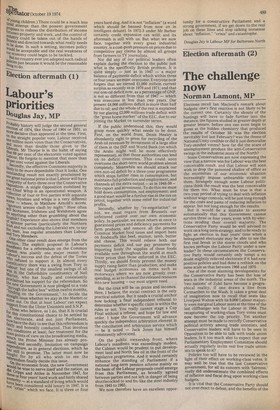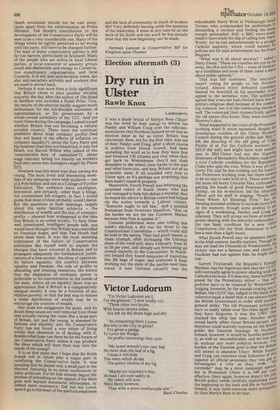Election aftermath (2)
The challenge now
Norman Lamont, MP
Elections recall Ian Macleod's remark about budgets: one's first reaction is not likely to be the correct one. Certainly the shouts of the hustings will have to fade further into the distance, the figures studied in greater depth at greater leisure, before one can even begin to guess at the hidden chemistry that produced the results of October 10: was the election inevitably lost last February? was the theme of National Unity credible or did it just demoralise Tory-minded voters? how far did the scare of unemployment produce the anti-Conservative swings in the industrial seats of the North?
Some Conservatives are now expressing the view that a narrow win for Labour was the best conceivable result, and that Labour will soon wish to drop the poisoned chalice of office as the enormities of our economic situation increasingly impose unbearable strains on them. Strangely enough some Labour politicians think the result was the best conceivable for them too. What must be true is that a two-year period of trying to deal with inflation without wage controls, will be just long enough for the costs and pains of reducing inflation to appear, but not long enough for the results. But it would be a mistake to assume automatically that this Government cannot survive three or four years, even with by-elections eroding their overall majority. The Conservative Party would be well advised to work on a long term strategy, and to be ready to fight an election in four years' time when a beleaguered electorate may be able to see the first real break in the storm clouds and who knows perhaps the Labour Party under a new leader? In these circumstances the Conservative Party would certainly only tempt a no doubt mightily relieved electorate if it had new positive policies and had done a rethink on the same scale as that between 1966 and 1970.
One of the most alarming developments for the Conservative Party has been the loss of seats in the industrial areas of the north. The 'two nations' of Sybil have become a geographical reality, if one draws a line from Carmarthen to the Wash. It takes a great deal of imagination now to recall that seats like Liverpool Walton with its 9,000 Labour majority were marginal Labour seats at the time of the last cliffhanger win for Labour in 1964. The recapturing of working-class Tory votes must now become the top priority. Yet another attempt must be made to revivify Conservative political activity among trade unionists, and Conservative leaders will have to be seen in Opposition to be able to talk with trade union leaders. Is it too much also to expect that our Parliamentary Employment Committee should actually regularly invite real live trade unionists to speak to it?
Policies too will have to be reviewed in the light of their effect on working-class votes. It may well be true that the last Conservative government, for all its concern with 'fairness,' really did underestimate the combined effects of inflation and fiscal drug upon working-class budgets.
It is vital that the Conservative Party should not over-react to defeat, and the benefits of the Heath revolution should not be cast away. Quite apart from his achievements as Prime Minister, Ted Heath's contribution to the development of the Conservative Party will be seen to be a very considerable one. Many of the things which he rightly perceived to be wrong with the party, still have to be changed further. The base of many constituency parties is still far too narrow, particularly in Scotland. Many of the people who are active in local Liberal parties, or local consumer or amenity groups could add distinction and energy to Conservative constituency organisations, and local Councils. It is not just anti-socialist votes, but also anti-socialists activists and workers that we need to attract back.
Perhaps it was more than a little significant that Britain chose to elect another socialist majority the day after the author of The Road to Serfdom was awarded a Nobel Prize. True, the results of the election hardly suggest much enthusiasm for the full-blooded extension of nationalisation, or for government by a whole-owned subsidiary of the TUC. And yet many times during the campaign I asked myself whether Britain was not becoming a natural socialist country. There were the continual questions about large company profits (had they not heard of the effects of inflation on company liquidity?), about the Tory Party and big business (had they not heard that it was Ted Heath, not Harold Wilson who talked of the 'unacceptable face of capitalism'?), about wage restraint falling too heavily on workers (had they never met managers caught by Phase III?).
Nowhere was this more true than among the young. The most lively and interesting meetings of my campaign were with students — one at a Polytechnic and one at a College of Further Education. The audience were intelligent, interested, and certainly, other than a fringe, not committeed left-wingers. In fact I would guess that most of them probably voted Liberal. But the questions at both meetings, largely about the same familiar subjects — the distribution of wealth and the size of company profits — showed how widespread is the idea that Britain is an unfair society. To hear these well intentioned, intelligent people talk, one would have thought that Britain was controlled by Venetian doges, and that Ted Heath had never been born, It was the most damning indictment of the failure of Conservative politicians like myself both to explain the changes that have occurred in Britain and to propagate adequately the fundamental justifications of a free society: the ideas of opportunity before equality, the conflict between equality and freedom, the role of profits in allocating and creating resources, the notion that the dispersion of economic power is preferable to its concentration in the hands of the state. Above all on equality there was no appreciation that if Britain is a comparatively unequal society it may be a function of our relative poverty; or that the best way to ensure a wider distribution of wealth may be to encourage the creation of wealth.
One must not exaggerate the point, and no doubt these issues are well removed from those that actually swung the votes. But a large part of Britain, not just the young, is obsessed by fairness and equality; and the Conservative Party has not found a way either of living within that obsession or of dealing with it. Besides what hope can there be for the future of the Conservative Party unless it can produce the ideas which will burn their way into the minds of the young? It is on that point that I hope that Sir Keith Joseph will in future play a major part in redefining the Conservative faith. It was puzzling that he played only a small part in the election, featuring in no press conferences or party politicals. For he had already begun the process of rethinking an the appeal of his ideas goes well beyond monetarist aficionados, or indeed mere economics. Did not his Luton speech go to the heart of the spiritual emptiness and the lack of community in much of modern life? Very definitely leaving aside the question of the leadership, it must in any case be on the back of Sir Keith and the work he has already done that the new beginning can be made.
Norman Lamont is Conservative MP for Kingston-upon-Thames



































 Previous page
Previous page